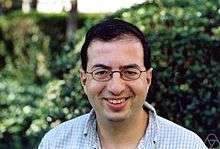Yuval Peres
| Yuval Peres יובל פרס | |
|---|---|
|
Yuval Peres | |
| Born |
5 October 1963 Jerusalem, Israel |
| Nationality | Israeli |
| Fields | Mathematics |
| Institutions | Microsoft Research, Redmond |
| Alma mater | Hebrew University of Jerusalem |
| Doctoral advisor | Hillel Furstenberg |
| Doctoral students | Elchanan Mossel, David Levin, Bálint Virág, Noam Berger, Alan M. Hammond, Gábor Pete, Manjunath Krishnapur, Lionel Levine, Asaf Nachmias, Ron Peled, Jian Ding, others |
| Notable awards |
Loève Prize (2001) Davidson Prize (1995) |
Yuval Peres (Hebrew: יובל פרס; born 5 October 1963) is a Principal Researcher in the Theory Group at Microsoft Research in Redmond, WA. He is known for his research in probability theory, ergodic theory, mathematical analysis, theoretical computer science, and in particular for topics such as fractals and Hausdorff measure, random walks, Brownian motion, percolation and Markov chain mixing times. He was born in Israel and obtained his Ph.D. at the Hebrew University of Jerusalem in 1990 under the supervision of Hillel Furstenberg.[1] He was a faculty member at the Hebrew University and the University of California at Berkeley.[1]
Peres was awarded the Rollo Davidson Prize in 1995 and the Loève Prize in 2001.[1] He was an invited speaker at the International Congress of Mathematicians in 2002. In 2011, he was a co-recipient of the David P. Robbins Prize. In 2012 he became a fellow of the American Mathematical Society.[2]
Peres has coauthored more than 250 research papers. Some of his long-term research collaborators are Itai Benjamini, Amir Dembo, Russell Lyons, Assaf Naor, Robin Pemantle, Oded Schramm, Scott Sheffield, Boris Solomyak and Ofer Zeitouni. He has advised 21 Ph.D students.
Books
- David A. Levin, Yuval Peres and Elizabeth L. Wilmer (2009), Markov Chains and Mixing Times, American Mathematical Society.
- J. Ben Hough, Manjunath Krishnapur, Yuval Peres, and Bálint Virág (2009), Zeros of Gaussian Analytic Functions and Determinantal Processes, American Mathematical Society.
- Peter Mörters and Yuval Peres (2010), Brownian Motion, Cambridge University Press.
- Russell Lyons with Yuval Peres (2012), Probability on Trees and Networks, Cambridge University Press, in preparation. Current version at .
External links
- Yuval Peres' Home Page
- Mathematical Genealogy of Yuval Peres
- David P. Robbins Prize for the paper Maximum Overhang, by Mike Paterson, Yuval Peres, Mikkel Thorup, Peter Winkler, and Uri Zwick.
- Plenary talk by Yuval Peres at the 2011 Joint Mathematics Meetings in New Orleans, LA
- A New Model For Proof-Checking, by Brown University computer scientist Claire Mathieu, describes Yuval Peres's influence on rigorous proofs in computer science.
References
- 1 2 3 David Aldous (October 2001). "Peres Receives 2001 Loève Prize" (PDF) 49 (9). Notices of the AMS: 999–1000.
- ↑ List of Fellows of the American Mathematical Society, retrieved 2013-02-23.
|
